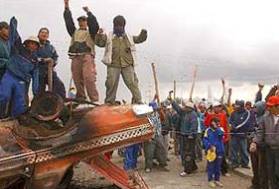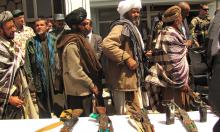Uncertainty reigns in Bolivia after President offered to resign
The Congress is expected to discuss the issue on Thursday, as protests continue
The resignation of Bolivia's President Carlos Mesa on Monday night has not put an end to the political and institutional crisis that slashes South America's poorest nation. Moreover, uncertainty reigns as the Congress badly agreed to meet on Thursday to discuss the resignation offer, as protests continue seizing the capital, La Paz, and road blockades paralyze the country.
As long as the Congress does not accept Mesa's resignation, the President will keep his post. In the meantime, an angry struggle for his succession has broke out, as the conservative movements demanding autonomy for the wealthy eastern region of Santa Cruz de la Sierra support Congress leader, Hermando Vaca Diez and leftist forces in the poor west make calls for early elections.
Under the constitution, the president of Congress will replace Mesa if the parliament votes to accept his offer. Mesa's term ends in 2007. The head of Congress, Hormando Vaca Diez, called on protesters to end the blockades and allow the parliament to take its decision without pressure from the streets. He said he would decide when to call a session on Mesas offer.
Vaca Diez represents the discredited traditional political parties in the Congress, but lacks of support among a majority of poor Indian groups, farmers and workers that have seized La Paz for the last three weeks. These sectors demand early elections and a simultaneous call on a Constitutional Assembly to deal with the problem of the autonomies and the control of the gas reserves, which aim to nationalize.
Evo Morales, a main opposition and farmer leader, demanded the resignation of both Vaca Diez and the leader of the lower chamber of Congress, leaving the power in the hands of the head of country's Supreme Court. Morales said total nationalization of the energy resources remained a priority. "We are a democratic movement and will support a democratic and constitutional solution," he said.
Meanwhile, other radical groups demand the resignation of all the congressmen as a way to renew all country's political institutions before the Constitutional Assembly meets. This is the most suitable alternative, according to analysts.
The situation in Bolivia is quite a delicate one, as tensions may end in the breakdown of this multi-ethnic state. In the east, the oil and gas rich departments of Beni, Pando, Tarija and Santa Cruz de la Sierra pursue autonomy to handle their incomes independently from the central power.
There, bandits of young members of the oligarchies have been attacking farmers and Indians protesting Santa Cruz separatist feelings. This sort of Christian-European “white guards” does not doubt to open fire to unprotected poor farmers of indigenous roots, who have organized themselves to resist.
In the poor Andean regions, demonstrators blame rich easterners on separatism as make them remember that all along Bolivian history the mining industries of the west feed them.
Bolivia is an unfair country, where a 10% elite of Spanish origin have exploited the majority of Indian ethnic groups before and after its independence from Spain in the late 1810s. Spanish colonizers exhausted vast silver reserves in the 1700s and 1800s. Foreign companies did the same with the tin. Bolivians fear the same will happen with their oil and gas reserves, the second largest in South America.
That is the origin of the latest turmoil, which came after Congress approved a new energy law increasing taxes paid on foreign companies working in Bolivia's oil and gas fields. Indian leaders protested the law failed to address their demands that the poor, indigenous majority see more benefit from the energy riches.
Mesa, a former television news anchor, was caught between Indians who say the nation's energy riches have gone only to a white, European-descended elite, and wealthy eastern provinces that feel they deserve more autonomy for the contributions they make to the economy.
Subscribe to Pravda.Ru Telegram channel, Facebook, RSS!





